Islam, a monotheistic faith, presents compelling evidence for its truth through the Quran’s inimitability, prophetic miracles, and moral teachings, offering guidance for all humanity.
What is Islam?
The Core Beliefs of Islam
The Significance of Islam in the Modern World

The Quran: The Holy Book of Islam

The Quran is Islam’s holy book, believed to be the literal word of God as revealed to Prophet Muhammad. It provides moral, spiritual, and legal guidance.
The Preservation of the Quran
The Quran has been miraculously preserved since its revelation, maintaining its original form for over 1,400 years. Muslims believe it is protected by God from corruption, as stated in the Quran itself.
Its preservation is attributed to both oral and written methods. Thousands of companions memorized the Quran during the Prophet’s lifetime, and it was written on parchment and bones. The process of compilation was overseen by caliphs, ensuring accuracy. The concept of tawatur (uninterrupted transmission) guarantees its authenticity, as it has been passed down through generations without alteration. This unique preservation sets the Quran apart from other religious texts, reinforcing its divine nature and reliability. Modern technology and manuscript evidence further confirm its unchanged state, making it a testament to Islam’s truth and enduring message.
Scientific Miracles in the Quran
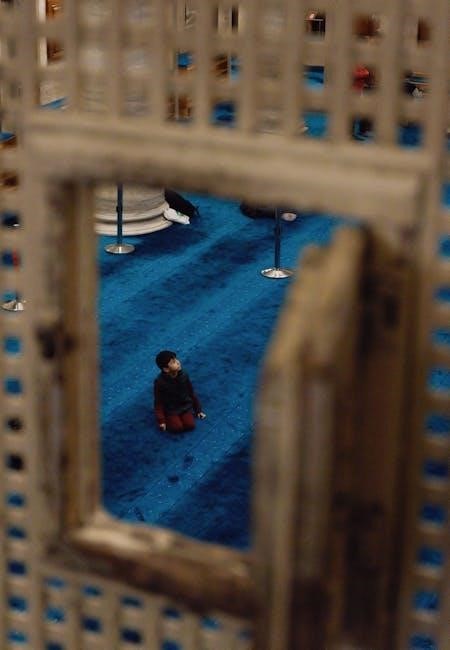
The Quran contains numerous scientific truths that were unknown during its time but have been confirmed by modern discoveries. For instance, it describes the Big Bang theory, stating that the universe began from a single point and is expanding. It also details the water cycle, describing how water evaporates, forms clouds, and returns as rain. Additionally, the Quran accurately describes embryonic development, mentioning stages like the zygote, embryo, and fetus, which align with modern embryology. It also refers to the orbits of celestial bodies and the darkness of the deep ocean. These scientific miracles, untouched by human error, are seen as evidence of the Quran’s divine origin, reinforcing Islam’s truth and the authenticity of its message.
The Stylistic and Linguistic Inimitability of the Quran
The Quran’s stylistic and linguistic inimitability, known as I’jaz, is a central proof of its divine origin. Its unique literary style, unmatched in Arabic literature, combines perfect grammar, rhythm, and rhyme. The Quran challenges humanity to produce even a single verse of similar quality, a challenge that has remained unmet for centuries. Its linguistic perfection is evident in its clarity, precision, and depth, making it accessible to all while maintaining profound theological and philosophical insights. This inimitability is seen as evidence of its divine authorship, as it transcends human capability. The Quran’s timeless beauty and eloquence continue to inspire and guide billions, affirming Islam’s truth and the prophetic mission of Muhammad (Peace Be Upon Him).
The Life of Prophet Muhammad (Peace Be Upon Him)
Prophet Muhammad, born in Mecca in 570 CE, was an orphan raised with integrity and compassion. He received divine revelations at 40, guiding humanity to worship One God, promoting justice, and fostering moral excellence, leaving an enduring legacy of faith and transformation.
The Early Life of Prophet Muhammad
Prophet Muhammad (Peace Be Upon Him) was born in Mecca in 570 CE. Orphaned at a young age, he was raised by his uncle Abu Talib, who nurtured his moral character. Known as Al-Amin (the Trustworthy), Muhammad earned respect for his honesty and fairness. He worked as a merchant, marrying Khadijah, a noblewoman, at 25. His early life reflected humility, kindness, and integrity, laying the foundation for his prophetic mission. At 40, he received his first revelation, marking the beginning of his divine call to guide humanity. His upbringing and reputation as a truthful and compassionate leader underscore the authenticity of his prophethood and the truth of Islam.
The Moral and Ethical Teachings of Prophet Muhammad
Prophet Muhammad (Peace Be Upon Him) emphasized moral excellence, teaching followers to uphold justice, compassion, and honesty. He stressed the importance of treating all people with kindness, regardless of their status, and advocated for the rights of the oppressed. His teachings promoted humility, forgiveness, and self-discipline, encouraging believers to avoid envy, greed, and arrogance. He also emphasized the value of fulfilling promises and upholding trust. The Prophet’s ethical guidance extended to caring for the needy, respecting women, and maintaining strong family ties. His teachings reflect a balanced approach to life, blending spiritual growth with moral responsibility, making his ethical legacy a cornerstone of Islamic values and a testament to the truth of Islam.
Prophecies and Miracles of Prophet Muhammad
Prophet Muhammad (Peace Be Upon Him) is believed to have fulfilled numerous prophecies and performed miracles that affirm his divine mission. The Quran itself is considered a miracle (I’jaz), with its unparalleled linguistic and literary perfection. Historical accounts, such as the Roman Empire’s victory over Persia and the conquest of Mecca, were foretold in the Quran. Miracles like the Night Journey (Isra and Mi’raj), where he ascended through the heavens, and the splitting of the moon demonstrate his prophetic authority. These events, witnessed and recorded by his companions, serve as evidence of his truthfulness and the divine origin of Islam, reinforcing the belief in his prophethood and the authenticity of the Islamic faith.
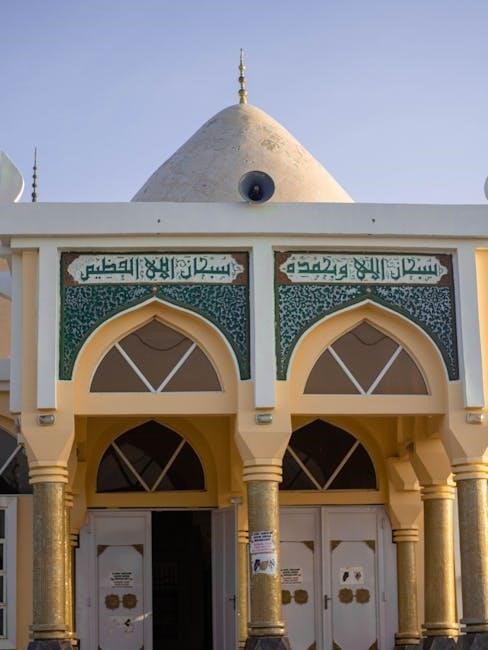
Islamic Teachings and Practices
Islamic teachings and practices emphasize a balanced life, guiding believers to connect with Allah through worship, ethical living, and community service, fostering spiritual and moral growth.
The Five Pillars of Islam
The Five Pillars of Islam are the foundational acts of worship and practice that every Muslim must observe. They include the Shahada (faith declaration), Salah (prayer), Zakat (charity), Sawm (fasting), and Hajj (pilgrimage). The Shahada is the declaration of faith in Allah and Prophet Muhammad, affirming the oneness of God. Salah requires Muslims to perform ritual prayers five times daily, fostering a constant connection with Allah. Zakat involves giving a portion of one’s wealth to those in need, promoting equality and compassion. Sawm is the fasting during Ramadan, cultivating self-control and empathy for the less fortunate. Finally, Hajj is the pilgrimage to Mecca, symbolizing unity and spiritual renewal. These pillars form the essence of Islamic practice, guiding believers toward a righteous and balanced life.
The Concept of Tawhid (Oneness of God)
Tawhid, the cornerstone of Islam, signifies the absolute oneness of God (Allah) in essence, attributes, and worship. It is the fundamental belief that Allah is unique, indivisible, and unparalleled, with no partners or equals. This concept rejects polytheism and idolatry, emphasizing that all worship, gratitude, and reverence must be directed solely to Allah. Tawhid is divided into three categories: Tawhid al-Rububiyyah (oneness in lordship), Tawhid al-Uluhiyyah (oneness in worship), and Tawhid al-Asma wa-Sifat (oneness in names and attributes). It distinguishes Islam from other religions and ideologies, providing a rational and spiritual foundation for understanding the universe and humanity’s purpose. Tawhid fosters a profound sense of devotion, unity, and submission to Allah, central to a Muslim’s faith and way of life.
The Role of Prayer, Fasting, and Charity in Islam

Prayer, fasting, and charity are foundational acts of worship in Islam, fostering spiritual growth and a deeper connection with Allah. Prayer (Salah) is performed five times daily, promoting discipline, mindfulness, and humility. Fasting (Sawm) during Ramadan strengthens self-control, empathy for the needy, and devotion to Allah. Charity (Zakah) is an obligation to give a portion of one’s wealth to those in need, ensuring social justice and purification of the soul; These practices cultivate compassion, gratitude, and a sense of community, while reinforcing Islamic values of submission, generosity, and moral accountability. They are integral to a Muslim’s holistic development and the fulfillment of their faith.
Historical and Cultural Impact of Islam
Islam has profoundly shaped global culture and history, revolutionizing science, art, and education during the Islamic Golden Age, paving the way for cultural and intellectual advancements worldwide.
The Spread of Islam Across the Globe
Islam’s expansion began in the 7th century, spreading rapidly from Arabia to diverse regions through trade, migration, and conquests. The faith reached Africa, Asia, and Europe, adapting to local cultures while maintaining its core teachings. Muslim traders and missionaries played a pivotal role in sharing Islamic values, while military campaigns opened new territories. The Quran’s message of unity and justice resonated with people seeking equality and spiritual guidance. By the 8th century, Islam had established a vast presence, shaping societies and fostering cultural exchange. This global spread highlights Islam’s universal appeal and its ability to integrate with various civilizations, leaving a lasting legacy worldwide.
Islam’s Contributions to Science, Art, and Culture
Islam has profoundly shaped global civilization, contributing significantly to science, art, and culture. During the Islamic Golden Age, scholars like Al-Khwarizmi and Ibn Sina revolutionized mathematics, medicine, and astronomy. Their works laid the foundation for modern scientific advancements. In art, Islamic architecture, with its intricate geometric patterns and grand structures like the Alhambra and Taj Mahal, became iconic. Calligraphy and miniature paintings flourished, reflecting Islamic aesthetic sensibilities. Culturally, Islam promoted tolerance and intellectual exchange, blending diverse traditions into a rich tapestry. These contributions underscore Islam’s enduring legacy as a catalyst for human progress and creativity, enriching societies worldwide for centuries.
The Islamic Golden Age and Its Legacy
The Islamic Golden Age, spanning from the 8th to the 14th century, was a period of extraordinary intellectual and cultural flourishing. During this time, Islamic scholars made groundbreaking advancements in mathematics, astronomy, medicine, and philosophy. Figures like Al-Khwarizmi, Ibn Sina, and Al-Biruni pioneered algebra, medical science, and astronomy, respectively. This era also saw the translation of ancient Greek texts, preserving knowledge that later fueled the Renaissance. The legacy of this period is profound, as it laid the foundation for modern scientific inquiry and established Islam’s role as a bridge between ancient and modern civilizations. Its impact continues to inspire scholarship and innovation today.
Addressing Common Questions and Objections
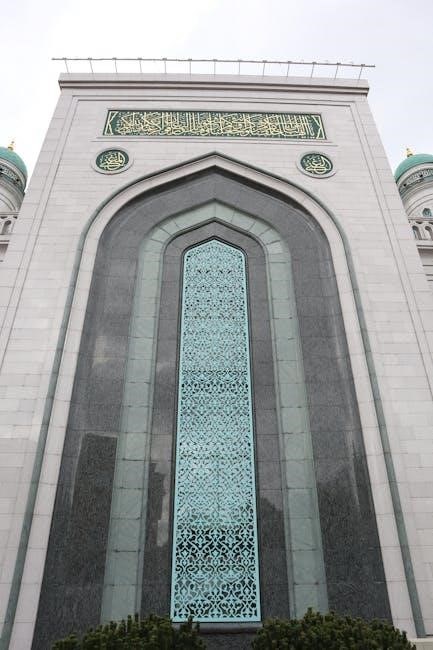
Addressing common questions and objections about Islam provides clarity, strengthening faith and understanding. It fosters dialogue, dispelling misconceptions and highlighting Islam’s universal truths and timeless wisdom.
FAQs About Islam and Its Teachings
Frequently Asked Questions about Islam provide insights into its core beliefs and practices. What is Islam? It is a monotheistic religion based on submission to God. Who is Allah? He is the one, all-powerful creator. What is the Quran? It is Islam’s holy book, believed to be God’s word. What are the Five Pillars? They are faith, prayer, charity, fasting, and pilgrimage. Is Islam peaceful? Yes, Islam teaches peace, justice, and compassion. What is Jihad? It refers to striving in God’s path, often misunderstood. How does Islam view women? It emphasizes equality and respect, with rights in marriage and society. These FAQs address common inquiries about Islam’s teachings and practices, offering clarity and understanding for seekers of knowledge.
Addressing Misconceptions About Islam
Islam is often misunderstood due to misinformation and cultural biases. One common misconception is that Islam promotes violence, but this contradicts its teachings of peace and justice. Jihad, often misrepresented, refers to personal struggle or defensive warfare, not terrorism. Another misconception is that Islam oppresses women, yet Islamic teachings emphasize gender equality, with women granted rights to education, property, and respect. Some believe Islam rejects other religions, but it recognizes Jews, Christians, and others as “People of the Book,” advocating coexistence. Islam is also not a new religion but traces its roots to Abraham and Moses. These clarifications help dispel myths and reveal Islam’s true nature as a faith rooted in compassion, justice, and unity.
Islamic Perspectives on Contemporary Issues
Islam offers guidance on modern challenges, emphasizing ethical and moral frameworks. On environmental sustainability, Islamic teachings advocate stewardship of Earth, as seen in the Quran’s emphasis on preserving natural balance. Regarding human rights, Islam upholds justice, equality, and dignity for all, rejecting oppression and discrimination. Gender equality is supported through Islamic principles that honor women’s roles in society, education, and economic participation. Islam also provides insights on technology and ethics, urging responsible innovation aligned with moral values. These perspectives demonstrate Islam’s relevance in addressing contemporary issues, blending timeless teachings with practical solutions for global challenges. Islam’s holistic approach encourages harmony between faith and modernity, fostering a balanced and compassionate worldview.
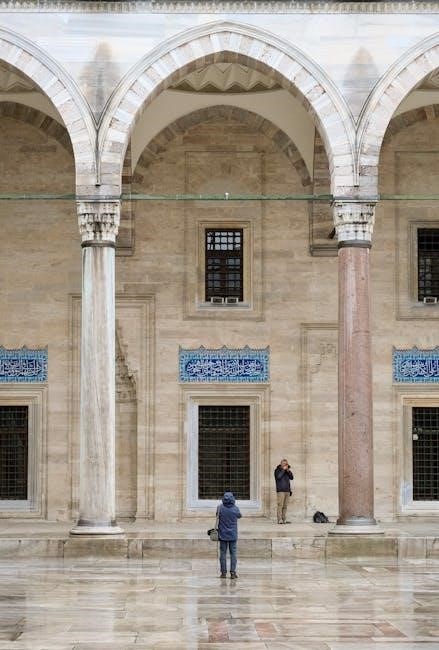
The Islamic Worldview
The Islamic worldview revolves around Tawhid, the oneness of God, emphasizing divine justice, human accountability, and the balance between free will and destiny. It provides a comprehensive framework for understanding life’s purpose, morality, and the afterlife, guiding believers to live harmoniously in this world while striving for the next. This perspective fosters a deep sense of meaning, responsibility, and connection to the divine, shaping every aspect of a Muslim’s life and interactions with the world.

The Concept of the Afterlife in Islam
In Islam, the afterlife is a fundamental aspect of faith, emphasizing accountability for one’s deeds. Believers hold that the soul continues to exist beyond death, facing judgment by Allah. The righteous, who lived according to divine guidance, are rewarded with Paradise (Jannah), a realm of eternal bliss, while the wicked face Hellfire (Jahannam), a place of punishment. The Quran vividly describes Paradise as gardens with rivers, shade, and abundant blessings, while Hellfire is depicted as intense suffering and regret. This belief motivates Muslims to strive for moral excellence and serves as a divine incentive for righteous living, fostering hope and accountability in their spiritual journey.
The Islamic Understanding of Divine Justice and Mercy
In Islam, divine justice (Adl) and mercy (Rahmah) are inseparable attributes of Allah, reflecting His perfect balance. Justice ensures fairness and accountability, while mercy embodies compassion and forgiveness. The Quran emphasizes that Allah’s mercy precedes His justice, as seen in His forgiveness of sins and provision for humanity. Divine justice is evident in the Day of Judgment, where deeds are weighed, and mercy is manifest in His willingness to pardon the repentant. This harmonious blend inspires Muslims to trust in Allah’s fairness while striving to earn His mercy through righteous living. The interplay of justice and mercy underscores Islam’s holistic view of divine sovereignty and human responsibility.
The Role of Free Will and Destiny in Islam
In Islam, the interplay between free will (ikhtiyar) and destiny (qadar) is a central theological concept. Muslims believe Allah has ordained all events, yet humans possess the ability to make choices. Free will allows individuals to act responsibly, while destiny ensures Allah’s plan unfolds. This balance means humans are accountable for their decisions within the framework of divine decree. The Quran emphasizes both human responsibility and divine sovereignty, teaching that while Allah knows all outcomes, individuals must strive to earn His pleasure. This harmonious coexistence of free will and destiny fosters a sense of purpose and trust in Allah’s wisdom, reassuring believers that their efforts and choices matter within His greater plan. This unique perspective addresses existential questions about control and meaning.
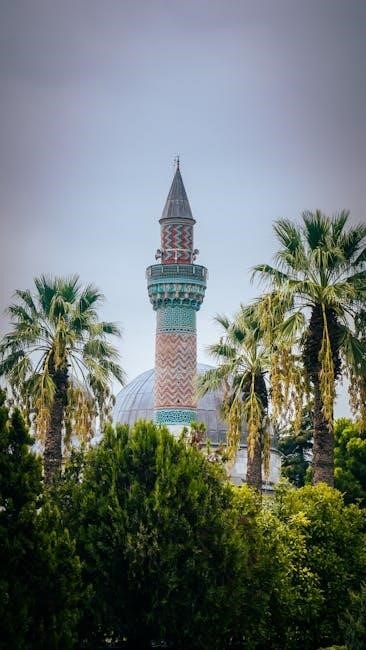
and Call to Action
Reflecting on the evidence, Islam offers a comprehensive guide to life, blending faith and reason. Its timeless teachings provide a moral framework for personal and societal growth. We encourage seekers of truth to reflect deeply, explore the Quran, and consider Islam’s profound message. Visit a mosque, engage with the community, and discover the transformative power of faith. May your journey lead to peace and enlightenment.
Summarizing the Evidence for Islam’s Truth
Islam’s truth is supported by the Quran’s unmatched preservation, stylistic inimitability, and scientific accuracy, which align with modern discoveries. The Prophet Muhammad’s life, marked by moral excellence and fulfilled prophecies, further validates Islam’s authenticity. Historical evidence, such as the rapid spread of Islam and its enduring impact, underscores its divine origin. The concept of Tawhid and the Five Pillars provide a coherent framework for worship and living. Islam’s emphasis on justice, compassion, and free will resonates universally. These elements collectively present a compelling case for Islam’s truth, inviting reflection and deeper exploration of its teachings.
Encouraging Further Exploration and Reflection
Exploring Islam invites individuals to embark on a journey of spiritual and intellectual discovery. By engaging with the Quran, the life of Prophet Muhammad, and Islamic teachings, one can gain profound insights into life’s purpose and meaning. Reflecting on Islam’s universal values, such as justice, compassion, and unity, fosters personal growth and understanding. Encouraging open-minded inquiry and dialogue, Islam welcomes seekers of truth to explore its timeless wisdom. Whether through personal study, community engagement, or attending lectures, deeper exploration enriches one’s perspective. This journey not only illuminates Islam’s teachings but also offers practical guidance for living a balanced and fulfilling life.
Resources for Learning More About Islam
To deepen your understanding of Islam, explore authentic resources such as the Quran, the Hadith collections like Sahih Bukhari and Sahih Muslim, and scholarly works by renowned Islamic thinkers. Websites like IslamQA and IslamicFinder provide reliable answers to common questions. Books like The Quran: An Eternal Challenge and The Purpose of Creation offer insightful perspectives. Engaging with local mosques or Islamic centers can also provide opportunities to learn from knowledgeable scholars and experience the community firsthand. These resources, combined with personal reflection, can help you gain a well-rounded understanding of Islam’s teachings and their relevance in today’s world.

Be First to Comment